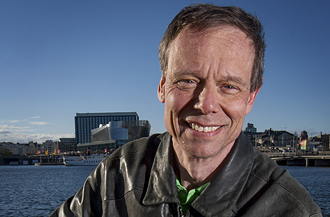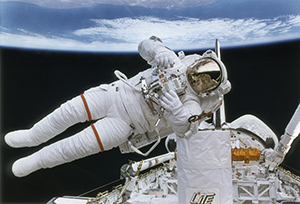
Moon tours and hotels in orbit — space travel's future takes off
In 20 years you'll be able to check into a motel on the Moon. Or why not take a flying tour around the Moon?
"A common misconception is that the USA has quit manned spaceflight. It hasn't," says Christer Fuglesang, Sweden's first person in space and the head of the Space Centre at KTH Royal Institute of Technology.
"In fact, the USA is currently developing a number of new spacecraft for research as well as for space tourism," Fuglesang says.
Fuglesang is, to date, Sweden's only astronaut, and an adjunct professor at KTH, where he is involved in a series of research projects relating to space travel.
And, he has developed a university course on human spaceflight, which he holds at KTH.

"The objective of the course is to provide comprehensive understanding about what is special about manned space travel. It is also important to highlight the economic and political issues that are most likely to shape the development of manned spaceflight," Fuglesang says.
There is a broad spectrum of problems that have to be solved in order to progress with further manned spaceflight. The ticket price is of course still the biggest bottleneck.
Elon Musk, the man behind the electric car company Tesla and SpaceX, however, aims to build simpler rockets. SpaceX reportedly is about to start production of these rockets according to the assembly-line principle, to bring down costs.
"Elon Musk is also looking at how to capitalize the first rocket stage instead of, so to speak, throw it away. There are ideas about rocket stages that can land themselves and then be reused. He wants to cut costs down to one-tenth of today's cost," Fuglesang says.

Fuglesang says that new technology is the best way around the cost problem. At the same time the space industry must invest in safety. A safer space is achieved by flying as much as possible. It is difficult to predict every possible error. The technology must be robust.
One of the research projects that Fuglesang has also been involved with concerns health in space. Together with other scientists he works to investigate what causes the flashes of light that space travelers experience in their eyes.
"The radiation environment is 50 times higher in space than on Earth, and astronauts can spend months in space. Some particle goes straight through the hull and also the human body. When they penetrate the eye, the astronaut experiences a flash of light, a white line through the field of view. Well, I have had this hundreds of times and this is something even space tourists will get to experience. In our research we investigate what happens in the eye," he says.
Fuglesang says that the more professionals going into space, the more problems can be detected and resolved. It is no coincidence that those astronauts sent up are from different types of professions — everything from particle physicists to physicians and veterinarians.
What about manned trips to Venus? Will they happen?
"It is more inhospitable on Venus than on Mars. To get anything at all to survive there for longer than a few hours is extremely tricky. It's 460 degrees on the planet, and air pressure is 90 times that of Earth," Fuglesang says.
Do you think holidays in space will be something people can buy in the future?
"Yes. More than 700 tickets have been sold to people for them to do a so-called space jump. Obviously the price tag will remain high for a while, but the ability to book a week at a space hotel is probably only 10 years away or so. A few years beyond that, it could be a holiday flying around the moon; and in 20 years it's possible we could see a hotel on the moon."
For the space jump, the idea is to go up to 100 km altitude, and there are ambitious plans for this to be offered in Sweden by Virgin Galactic. WorldView Enterprises, which sends up balloons to the edge of space, could also offer these trips to tourists from Sweden in the future. However, laws and regulations need to be reviewed to allow for this type of travel.
Fuglesang recently met with officials from different government ministries to develop the legal aspects for civilian spaceflight, especially with regard to space tourism.
"It is important that there is a regulatory framework so that those space jumps will happen from Sweden," he says.
The reason is simple. What happens in space tourism plays a role in space research, and vice versa.
"There are a lot of new spacecraft being developed that can take people, for example, in orbit around the Earth. The companies that develop them want to earn money. So, what craft is used to — whether it's research or pleasure — doesn't matter to manufacturers. Furthermore, NASA provides development grants to companies for service and mission performed," he says.
A market for space tourism is undeniable. In addition to the 700 space jump tickets, several people bought round trips to the International Space Station (ISS).
"Hotel magnate Robert Bigelow is aiming to build the first space hotel. Indeed, in the form of a space station. They have already sent up test modules and the technology to be tested on ISS," he says.
In terms of purely scientific missions, NASA is to build a new giant rocket called the Space Launch System, SLS. It will be designed to carry the Orion space capsule, which has the capacity to transport four astronauts to the moon. The capsule is expected to fly with astronauts to the moon in 2021.
Peter Larsson

